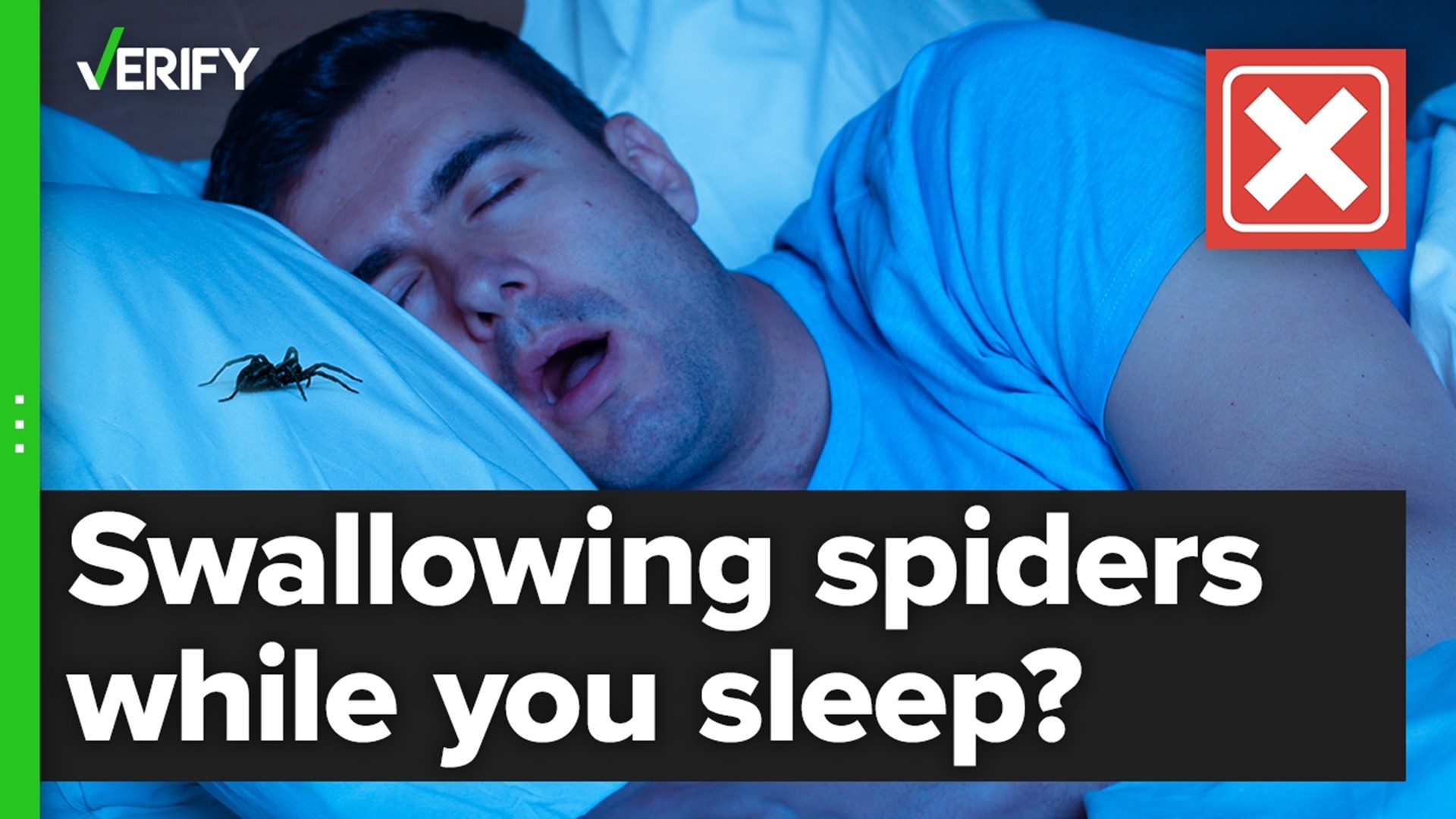Social media posts that claim we swallow several spiders while sleeping have been horrifying people online for years.
Some of the claims suggest humans swallow up to eight spiders per year in their sleep while others allege that people swallow nearly a pound of the creepy crawlies in the night throughout their lifetime.
VERIFY viewer Kerry asked our team in an email if these claims are true.
THE QUESTION
Do people regularly swallow spiders while sleeping?
THE SOURCES
- Burke Museum, a natural history museum in Seattle, Washington
- "Insect fact and folklore," a book by Lucy Wilhelmine Clausen
- Floyd Shockley, Ph.D., collections manager in the Department of Entomology at the Smithsonian National Museum of Natural History
- Michael J. Breus, Ph.D., clinical psychologist and clinical sleep specialist, known as “The Sleep Doctor”
THE ANSWER
No, people don’t regularly swallow spiders while sleeping.
WHAT WE FOUND
The claim that people regularly swallow spiders during sleep is a very widespread urban legend, according to Rod Crawford, a spider specialist at the Burke Museum in Seattle. He says not only is it “highly unlikely,” there is no scientific evidence to support this claim.
“For a sleeping person to swallow even one live spider would involve so many highly unlikely circumstances that for practical purposes we can rule out the possibility. No such case is on formal record anywhere in scientific or medical literature,” Crawford wrote on the museum’s website.
Floyd Shockley, an entomologist at the Smithsonian National Museum of Natural History and Culture, also says people don’t swallow spiders in their sleep.
“As a scientist, I absolutely cannot rule out the possibility of a spider falling from the ceiling right at the exact moment as you yawn or something like that, but the number of things that would have to happen for that to play out is astronomically small. So, it would be such a rarity, and it certainly would have been published, if it had ever actually happened,” Shockley told VERIFY.
Shockley sys the idea that people swallow spiders during sleep first appeared in a fictional book on insect and spider folklore that was published in 1954. Since then, he says the myth has spread like wildfire over the years, especially through email chains and social media.
According to Shockley, the number of spider species that actually live with humans is incredibly small, and almost all of them are not dangerous to humans. He says if a spider is in a person’s home, its main goal is to hunt insects that have gotten inside — not to bother sleeping humans.
“They're not actually there because they like us. It's because we create a nice, warm, temperature-stable environment for them to hunt. For the most part, they ignore us,” Shockley said.
Another reason why it’s highly unlikely for a human to swallow a spider during sleep is because 9 in 10 people sleep with their mouths closed, Michael J. Breus, a clinical psychologist and clinical sleep specialist known as “The Sleep Doctor,” told VERIFY.
“Spiders are not going to walk into basically a dark moist cave where all that's coming out of it is carbon dioxide — that doesn't really make a lot of sense, just from an entomology standpoint,” Breus told VERIFY.
As for the people who do happen to sleep with their mouths open and snore, Shockley says spiders will not want to get close to the source of the snoring.
“If you're sleeping with your mouth open, you're probably snoring, and the vibration is going to scare them away,” Shockley said.
Crawford sets the record straight about a variety of “Spider Myths” on the Burke Museum’s website, including the myth that all spiders make webs — only about half of the known spider species catch prey that way. He also debunks the claim that spiders can climb up tub and sink drains when it’s cold.

